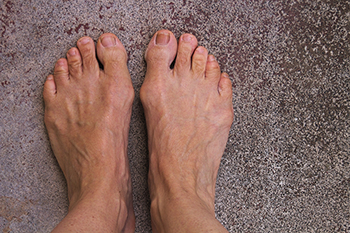
A bunion is a common foot condition that affects millions of people worldwide, and it is considered to be a deformity. Many people can develop a bunion from genetic reasons, or from wearing shoes that do not have enough room for the toes to move freely in. It is noticeable as a bony lump that gradually forms on the side of the big toe, and larger shoes may need to be purchased. If the bunion is large, it may cause the other toes to shift toward each other, which may result in pain and discomfort. Additional symptoms that can accompany a bunion can include calluses forming on the second toe, inflamed skin on the big toe, and the toes may be hard to move. There may be a decreased range of motion in the big toe, and patients may experience chronic pain. Mild relief may be found when the correct size and style shoes are worn, and a protective covering may be put over the bunion which may help to reduce friction. A podiatrist is qualified to diagnose and treat bunions, and it is strongly suggested that you confer with this type of doctor if you have this foot condition.
If you are suffering from bunions, contact Glenn Aufseeser, DPM of Lakewood Foot and Ankle Specialists. Our doctor can provide the care you need to keep you pain-free and on your feet.
What Is a Bunion?
A bunion is formed of swollen tissue or an enlargement of boney growth, usually located at the base joint of the toe that connects to the foot. The swelling occurs due to the bones in the big toe shifting inward, which impacts the other toes of the foot. This causes the area around the base of the big toe to become inflamed and painful.
Why Do Bunions Form?
Genetics – Susceptibility to bunions are often hereditary
Stress on the feet – Poorly fitted and uncomfortable footwear that places stress on feet, such as heels, can worsen existing bunions
How Are Bunions Diagnosed?
Doctors often perform two tests – blood tests and x-rays – when trying to diagnose bunions, especially in the early stages of development. Blood tests help determine if the foot pain is being caused by something else, such as arthritis, while x-rays provide a clear picture of your bone structure to your doctor.
How Are Bunions Treated?
- Refrain from wearing heels or similar shoes that cause discomfort
- Select wider shoes that can provide more comfort and reduce pain
- Anti-inflammatory and pain management drugs
- Orthotics or foot inserts
- Surgery
If you have any questions, please feel free to contact our offices located in Lakewood and Manchester Township, NJ . We offer the newest diagnostic and treatment technologies for all your foot care needs.
